- Home
- Lisa Wingate
Good Hope Road Page 26
Good Hope Road Read online
Page 26
“All right.” I looked at my hands in my lap, trying to imagine what she might say.
She took a deep breath and let the air out slowly, thoughtfully. “I’m worried about what’s going to happen to you when all of this is over. June, Doc … uhhh … Doc Albright, we’re all worried. We talked about it some the other night.”
I remembered seeing the three of them talking, and blood prickled hot into my face. “I’ll be all right,” I said, like I didn’t know what she meant, but of course I did. “Things will just …” I swallowed hard, my eyes burning. “It’ll be the same as always, I guess.”
Mrs. Gibson huffed a breath of air and smacked her lips. “Well, that ain’t good enough. It ain’t good enough for things to go back the way they always been, is it?”
I shook my head, staring at my hands in my lap. “No.” It was the one thing I hadn’t been willing to admit, even to myself.
“Doc Albright thinks you ought to sign up for this program in St. Louis where they let young folks work in hospitals and take college classes in medicine and such. He thinks you got a lot of talent for doctorin’ folks.”
I sat very still, trying to grasp what she was saying, trying to imagine myself doing what she was describing—leaving Poetry, leaving everything, going to college, working in some hospital somewhere, someplace where no one knew me. Someplace where no one knew …
“We couldn’t afford something like that.” I let out the breath I had been holding and wiped my eyes, impatient with myself. What was I doing, pretending something like that could happen?
“Doc Albright says he knows the people that run the program. He says he can get you in. You can get scholarships and work-study to pay for it. He says the program is for kids whose families don’t have much money. He says he thinks you would be good at it. It starts in four weeks.”
My heart fluttered in my throat, and panic spun through me. Four weeks. “I … I have to take care of Nate and Daddy.” I felt like a person being swept out to sea, grabbing for a rope. “I couldn’t go in four weeks.” Or ever. “Maybe … maybe I could go later in the year. Next semester or something.”
I could feel Mrs. Gibson watching me. “Doc says they only take a new class once a year.”
“I … I could go next year.”
She slapped a hand against the concrete. “You know you won’t go next year. If you don’t do it now, it’ll be too late. You’re only gonna be at this point once in your life, where you have this chance.” She took my hand in both of hers and leaned close to me, watching my eyes. “There ain’t any future in staying here tryin’ to hold that farm together for your daddy. He’s a grown man. It’s time he took care of himself.” She met my eyes, her gaze glittering with determination. “There ain’t any future in getting with that Shad Bell either, Jenilee Lane, and you know it. I know it feels like the easy thing to do, but if you do what’s easy, you’re gonna end up in the same place as your mama.”
Was that what I had been doing? Was I staying in Poetry because I was needed, or because I needed to stay—because I didn’t have the courage to leave?
My mind whirled with possibilities, like pictures in the wind. I imagined what it would be like to leave everything behind, to become somebody new. I wondered if it would really be possible to be a doctor, like I had pretended to be years ago while caring for calves and puppies and kittens before I was old enough to understand the reality of the world I was living in.
My heart started to open that door again. It’s a mistake, part of me said. It’ll only end up hurting.
“I can’t,” I heard myself tell her.
“But if you could, would you? If something could be worked out, would you go? Would you want to?”
Tears blurred my vision, and I stood up, throwing my hands into the air, afraid to say yes, afraid to say no. “I … I can’t,” I sobbed.
“Jenilee Lane!” Mrs. Gibson’s voice was stern. I jerked upward, looking at her, thinking of all the times Mama said my name that way.
Mrs. Gibson came at me with her hands on her hips. “You stop that kind of talk! I know you think I’m a pretty horrible person, but, by God, I never in my life went around sayin’ ‘I can’t.’ I never let people walk all over me, neither. I always had enough pluck to stand up for myself, and it’s time you showed some pluck of your own. If you ever want any kind of a life, you gotta get yer back up and make it for yourself, and you ain’t gonna do it by hanging around here lettin’ that no-good daddy of yours run your life, and pretending that’s all right. Doc Albright is offering you a chance, and that chance probably ain’t gonna come along again.”
I knew she was right, that if I didn’t take it now, this chance, my chance, would probably pass me by. The idea was almost too painful to consider. The life that only days ago I had planned for myself now seemed terribly wrong, impossibly small.
Yet, in the end, all the facts remained the same, especially the most important one. “I can’t leave Nate.” I felt the air go out of me as I said it. In the end, that one reality outweighed all the fantasies about what I might do. “I just can’t. He’s only sixteen, and he still has two more years of high school left. Coach says that if he’ll just buckle down on his grades, he can have a scholarship to Missouri State for baseball. If I leave now, he’ll drop out and he’ll go to work for Shad’s daddy full-time, and that will be the end of it.”
“I ain’t askin’ about the practicalities of it right now. Right now what I’m askin’ is, if you had the chance, would you go try this work-study program that doctor has in mind?”
Turning away from her, I stood for the longest time, and watched the sun light the Poetry sky on fire, and tried to think. Below, the church workers began emerging from the motor home, and a few people wandered from their tents, stretching and talking to one another as they watched the day come into being.
“There ain’t gonna come some point in your life when you get to start all over.” I heard Mr. Jaans’s voice float from the doorway like a quiet breeze. I turned around, and he was standing on one foot, his hands braced on the back of a chair for support.
His cloudy blue eyes looked into mine. The noise in my head, everything around me, faded away, and I saw only his eyes reflecting the morning sky as he spoke. “Life don’t come around but once, Jenilee. It don’t come with do-overs. This, right now, this is your life. Every minute you got, every talent you got, those are your God-gifts. He give them to you for a reason.” He raised a quivering hand, pointing a finger at me. “You think hard about what He’d want you to do with them gifts. You think hard about what you want to do.”
“I want to go,” I whispered, the words coming from somewhere deep inside me, some hidden place I barely knew.
He nodded, his eyes falling closed, then opening slowly, meeting mine again. “Then it’s time to find a way.”
“How?”
“One step, then another,” he answered, and smiled. “We been seeing miracles all week long, haven’t we?” He turned and disappeared into the darkness of the armory, pushing the chair ahead of himself.
I felt Mrs. Gibson’s hand over mine, her fingers cool and trembling. “We’ll find a way,” she said. She swept a hand toward the ball field below us. “A long time ago, I sat with your grandma on that very field, and we watched you in a little blue dress hunting Easter eggs. Your granddaddy had just passed away the week before, and I think your grandma knew that she wasn’t going to be far behind him.”
She paused, and I felt her watching me. “She asked me to promise that Olney and I would help the four of you get out. She said the week before, your mama had a big bruise on her, and she’d miscarried a baby, and she didn’t have a good explanation for where that bruise come from or how she fell down and lost the baby. Your grandma knew the four of you needed to get out. She didn’t want to see you left alone in this world. She knew what kind of life that would be. I promised her that Olney and I would look after your mama and you kids—that we’d help your mama find a way.
I stood on this very field that day, and looked at your mama and you, and I made that promise, one friend to another.”
I met her gaze, trying to understand what she was saying. In all of my life, Mrs. Gibson had never so much as looked my way, much less tried to help Mama and us kids, or treated us like family.
She turned her face from me, as if she knew what I was thinking. “I meant that promise when I said it. I truly did, child. Then your grandma passed away, and two weeks after that, Olney had a heart attack and fell off the tractor in the field.”
I remembered all the dark cars at her house down the road, and the low murmur of many voices, and Mama wanting to take a casserole down there, and Daddy saying she shouldn’t. The images painted themselves in my mind, clear and stark, drawn with the innocent lines of childhood memory, not understood at the time.
Breath shuddered into Mrs. Gibson’s lungs and trembled through her body as she remembered. “Oh, God forgive me, I was so covered up with grief. I was so covered up with my own grief that I couldn’t think about anyone or anything else. I hid myself away, and I forgot that promise. That’s one of the worst things I ever done. I turned my back.”
We stood silent for a long moment, neither of us knowing what to say. Gazing at the ball field below, I remembered my blue dress. I remembered my grandmother, and how calm and gentle the world we shared with her and my grandfather was.
“It doesn’t matter now,” I said softly. “I guess we just go forward from here.”
Mrs. Gibson wiped her eyes and reached across the space between us, her arms slipping around me, hugging me close. I held on, thinking of that instant in the cellar when my hand slipped through the darkness and touched hers, and everything changed.
“Who’d of thought it?” She released me and stepped back, took her hankie from her pocket, dabbed at her eyes and blew her nose. “Who’d of ever thought I’d be standing here with you—old Eudora Gibson and little Jenilee Lane, leanin’ on one another? Who’d of ever thought something good would come out of all this tragedy? I thought this storm was gonna be the end of me. I didn’t see how I’d go on from here, old as I am, and with my house gone, and my memory failing, and my old things and my notebooks thrown to the wind. I thought it was the end of everything.”
“Me, too,” I whispered, remembering those moments after the tornado, when I wished that everything about me had been swept away in that storm. What I didn’t realize then was that it had.
“Little did we know, it was just the beginning of something new.” She gazed across the ball field, as if she could see the future.
I looked too, and wondered what she saw. For me the vision was still cloudy, like something from a book of fairy tales. I wished I could see as clearly as she did, feel as positive as she did that everything was going to work out according to some plan that was larger than we were.
“I do wish I hadn’t lost my notebooks,” she said, sighing. Her shoulders slumped forward and she held her hands in front of herself. “I doubt if these old hands will ever write all them things down again. I guess I couldn’t, really… .”
“You can’t remember, can you?” I put words to the question that had been creeping through the back of my mind for days. “That’s why you keep the notebooks.”
She slumped against the steps, her head nodding forward. “That’s why I keep the notebooks. That’s the truth of it. I’m better here these last few days since the tornado, but the truth of it is I’m worried that I’m losing track of things.”
“Have you told anybody? Did you go see a doctor about it?”
“I didn’t want anybody to know. I don’t want anybody thinking I’m a burden. My mama got dementia when she got old, and she withered away for years with everyone having to take care of her.” She drummed her fist angrily in her lap. “I don’t want to be like that. I ain’t gonna be like that.”
I reached over to comfort her, then pulled my hand away, not knowing whether that would make things harder or easier. “Then you should see a doctor about it. These days there are tests they can run, medicines and hormones, special diets, and things that help. I read about them when I was sitting in the hospital with Mama.”
She didn’t answer. I wondered if she heard.
“You should get help,” I pressed. “You just said that if I wanted any kind of life, I was going to have to get my back up and make it for myself. You said you had pluck, whatever that means. Well, it doesn’t take much pluck to sit around waiting to lose your mind, just because you don’t want to admit to anyone that you’ve got a problem, does it? If you’re going to sit around and do nothing, you might as well have died in that cellar.”
Her jaw hardened, and she raised her chin. “Reckon I need to pull myself out of the pity pit and get on with life, don’t I?”
“Yes, I think you do.” I punctuated the words with a nod, feeling good.
“Reckon we both do.” She gave me a sly, sideways grin. “Reckon it’s time we Good Hope Road gals got ourselves together and showed the world why God saved us from that tornado.”
“Yes, I think it is.” The generator roared to life behind the armory, and I realized how long we had stood there talking. Drew and Nate would be wondering where I was. “I have to go now,” I said finally. “There’s a lot to do.”
“Yes, there is.” She patted me on the shoulder and started up the steps. “The first thing I gotta do is right inside this building.”
She disappeared through the doorway.
Caleb Baker came out as she was going in. “Thought I never would get that generator started.” He smiled, but didn’t meet my eyes.
I wondered if he had heard the conversation between Mrs. Gibson and me, and if he had been in on the talk with Dr. Albright the night before. “You know what she was talking to me about, don’t you?”
He nodded, pretending to be busy finding the end of a roll of gauze in his hands. “Yes, I knew. I heard them talking about it last night.”
“What do you think about it? Her idea, I mean. What would you do if it was you?”
“It’s not me.”
“But if it were.”
He focused on the roll of gauze, wrapping it around the scars on his forearm. He seemed to realize what he was doing suddenly, and flushed. “Sorry.” He turned his shoulder to me so I couldn’t see his arm. “Sometimes these things smart in the morning and I have to keep the air off them for a while. They’re not a pleasant thing to look at.”
“It doesn’t bother me, Caleb.” I sidestepped and held the end of the gauze for him, then waited while he wrapped one arm, then the other. “So if it were you, what would you do? About Dr. Albright’s offer, I mean.”
“I’d go.” He stuck his hands in his pockets. “You know, if you’re worried about moving to a big city like St. Louis alone, I’ll be going back to college there this fall. I had to take last year off after my car wreck. I could help you get settled, show you around, things like that.”
“You don’t have to do that, Caleb,” I said. “I’ll be all right.”
“I want to.” He rushed the words out, then seemed embarrassed. “It’s going to be a little strange, going back to college after the year off, and with the scars, and now after the tornado. I guess I liked the idea that you’d be there.”
A lump caught in my throat. In all my life, I couldn’t remember anybody but Nate acting like they wanted me around. “Maybe I will be,” I said. I couldn’t make any promises. Not yet. “It’ll depend on what happens with Daddy, and with Nate.”
He nodded soberly. “Well, listen. Don’t be a stranger, either way. When the phones get back on, I’ll call and give you my number. You can give me a ring if … well, if you need anything. If there’s anything I can do to help. I still owe you one, you know.”
He smiled into my eyes and a warm feeling washed through me. “You don’t owe me anything, Caleb.”
“Yes, I do.” Still grinning, he turned and started toward the motor home. “No good-byes. Just ‘see ya
later,’ all right?”
“All right, see you later.”
I climbed into the truck and left the armory behind with no idea of what was to come next.
On the way home, I tried to think of what I would say to Drew and Nate—what kind of plans should be made, what kind of plans could be made, when we still didn’t know about Daddy.
In my mind, I began planning a future in which Daddy came home from the hospital in one piece, and I said something like, Nate and I are leaving, Daddy, and there isn’t a thing you can do about it. We’re moving out. Nate is going to finish high school and go to college on a baseball scholarship, and I’m going to college. Drew’s going home to his son and his daughter, and he’s going to be a good father. He’s going to make a life. We’re all going to finally do the things that normal people do.
I pictured myself saying that to him. I played it like a movie script in my mind.
Shad and Nate were sitting on our porch when I drove up to the house. The two of them were laughing and drinking beer, the way they had these last few weeks since Shad came home.
I ran across the yard and grabbed the beer out of Nate’s hand. “Your pain medicine says no alcohol. Geez, Nate, don’t you have a brain in your head? Do you want to end up back in the hospital?”
Nate blinked at me, his reactions slow, his eyes dulled by the combination of beer and medication. “I’m all right. Shad gave me some of my pain pills for my leg.” He chuckled, closing his fist and rapping his knuckles hard against the cast. “Heck, it doesn’t hurt one little bit now. This stuff is great.” Rolling his head against the back of the chair, he closed his eyes, still smiling. “I feel good.”
Anger flamed inside me, and I turned on Shad, throwing the beer past him so that it clattered down the steps and landed on the lawn. “Good Lord, Shad, what in the world do you think you’re doing! How many of those did you give him? What’s wrong with him?”
Shad rolled his eyes at me the same way he did when I nagged him about turning in his time sheets at the construction office. “Settle down, Jenilee. It ain’t gonna hurt him. That stuff is like baby aspirin. One pill didn’t do him any good, so I gave him two. It’ll just mellow him out a little.”

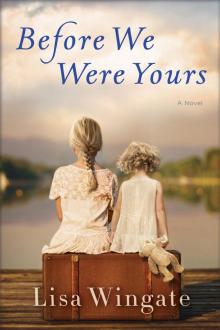 Before We Were Yours
Before We Were Yours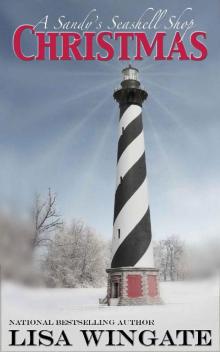 A Sandy’s Seashell Shop Christmas
A Sandy’s Seashell Shop Christmas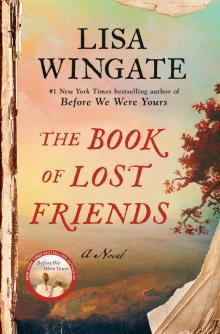 The Book of Lost Friends
The Book of Lost Friends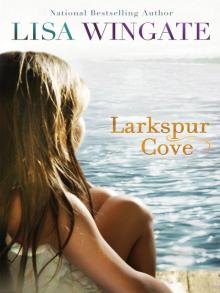 Larkspur Cove
Larkspur Cove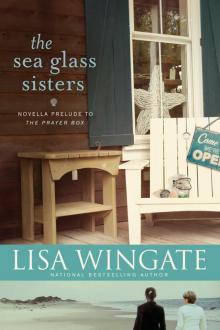 The Sea Glass Sisters
The Sea Glass Sisters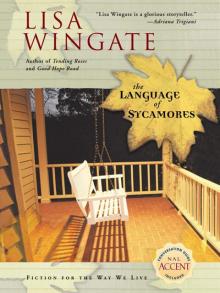 The Language of Sycamores
The Language of Sycamores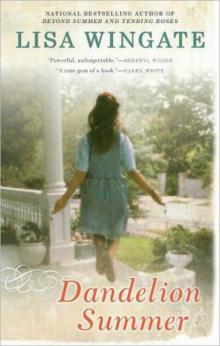 Dandelion Summer
Dandelion Summer Word Gets Around
Word Gets Around Beyond Summer
Beyond Summer Firefly Island
Firefly Island The Tidewater Sisters: Postlude to The Prayer Box
The Tidewater Sisters: Postlude to The Prayer Box Talk of the Town
Talk of the Town![Blue Sky Hill [01] A Month of Summer Read online](http://i1.bookreadfree.com/i1/03/29/blue_sky_hill_01_a_month_of_summer_preview.jpg) Blue Sky Hill [01] A Month of Summer
Blue Sky Hill [01] A Month of Summer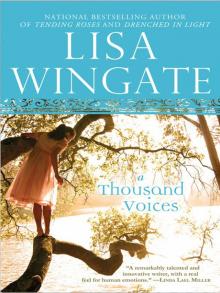 A Thousand Voices
A Thousand Voices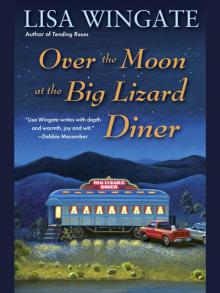 Over the Moon at the Big Lizard Diner
Over the Moon at the Big Lizard Diner Never Say Never
Never Say Never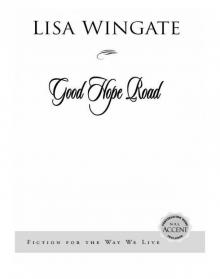 Good Hope Road
Good Hope Road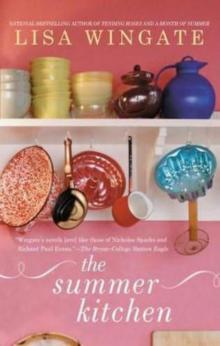 The Summer Kitchen
The Summer Kitchen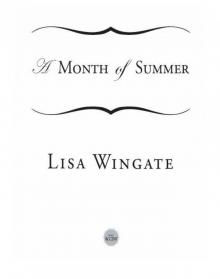 A Month of Summer
A Month of Summer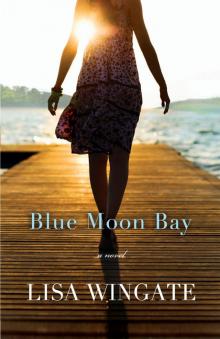 Blue Moon Bay
Blue Moon Bay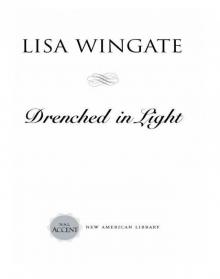 Drenched in Light
Drenched in Light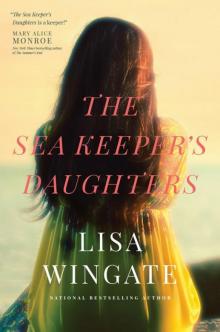 The Sea Keeper's Daughters
The Sea Keeper's Daughters